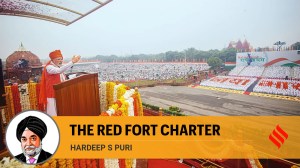‘First-generation lawyers overlooked’: Allahabad HC flags ‘entitlement culture’ in state counsel appointments
Making the observation, the court said only scions of influential families are given opportunities to represent state corporations, and highlights the decay in the system
 The court also observed that in the currently existing system, young first-generation counsel “who are not well-connected politically or do not belong to influential families” are overlooked in appointment as counsel for the State or State-run Corporations despite their competence and scholarship.
The court also observed that in the currently existing system, young first-generation counsel “who are not well-connected politically or do not belong to influential families” are overlooked in appointment as counsel for the State or State-run Corporations despite their competence and scholarship.Criticising the prevailing entitlement culture in the appointment of counsel for state corporations, wherein opportunities are extended predominantly to scions of influential families, the Allahabad High Court observed that a considerable number of first-generation lawyers seldom receive an opportunity to represent such corporations.
The court made the observation while hearing a petition filed by one Jubeda Begum and others against the Uttar Pradesh State Road Transport Corporation (UPSRTC).
The order stated that the writ petition arose due to prima facie disobedience of the court’s directions. Upon inquiry, the respondent Corporation found that the situation resulted from professional negligence or incompetence on the part of the counsel representing it before the Labour Court. The Corporation has since initiated appropriate action in this regard.
The court observed, “Appointment of meritorious counsel by a fair and transparent procedure is central to good governance of a government corporation and is consistent with the mandate of constitutional law. Hitherto, an entitlement culture has taken root in appointments of counsel for State corporations, where only scions of influential families are given opportunities to represent (them). This observation does not take away the competence of any counsel appointed by the Corporation, but highlights the decay in the system where these offices are appropriated by those who can peddle influence in the corridors of power.”
“The matter is not res integra. The Supreme Court, in Kumari Shrilekha Vidyarthi vs State of UP… enjoined the State to adopt a transparent and fair procedure while appointing State counsel. The said mandate applies in equal measure to various government corporations, including the UPSRTC.”
The court said that several first-generation lawyers are very competent, possess unimpeachable integrity, and are industrious by disposition. “Counsel of the aforesaid class rarely get a look in when appointments of State counsel or counsel for the Corporations are made, as they are not able to curry any influence with the powers that be. Modes of appointment of counsel which accord weight to accidents of inheritance and neglect achievements of merit cannot be countenanced in State Corporations.”
It further added that, “This culture of appointments has also degraded the professional representation of the Corporations. In many cases, this Court has found that the counsel for the Corporations who are appointed through the spoils system receive notices and do not appear in court. They simply sub-delegate the files entrusted to them.”
The court also observed that in the currently existing system, young first-generation counsel “who are not well-connected politically or do not belong to influential families” are overlooked in appointment as counsel for the State or State-run Corporations despite their competence and scholarship.
“The failure of the State instrumentalities to discern merit in such a class of counsel can be disheartening to young first-generation lawyers… Such an environment prevents members of the Bar from developing and contributing to the rule of law. The unjust nature of the system has serious adverse consequences on governance by law. The justice delivery system becomes weak and unable to serve… common citizens due to systemic deficiencies.’
The court added that, “The responsibility of all State authorities is to uphold the rule of law and fairness. Selection of counsel can only be made by independent and dispassionate observance of court proceedings by officials of the Corporation who are regularly present incognito in court. The procedure thereafter demands a rigorous system of checks and balances on the professional competence and integrity of counsel. This may also require a formal interface with the authorities concerned. However, selection methods are a matter of details which the authorities can evolve based on institutional experience as well.”
UPSRTC Managing Director Masoom Ali Sarvar, who was present in court, assured that all endeavours shall be made by the Corporation to ensure that the best talent from the Bar is looked at while making such appointments.
The court stated that a system which adopts transparent procedures, promotes merit, and gives a fair look at young first-generation lawyers while appointing counsel to represent UPSRTC in court has to be devised by the Corporation.
For this purpose, a meeting of the UPSRTC Board shall be held before the next date of listing — September 9 — and the scheme shall be finalised to be presented before the court.
On a prayer filed by the petitioners’ counsel, the court granted time to file an amendment application.
The court also directed the UPSRTC Managing Director to file an affidavit on the next date of listing. The counter affidavit shall also be filed before the next date of listing, it added.







